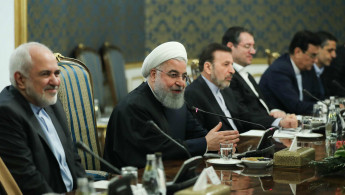Iran to reduce nuclear commitments: state media
Iran will reduce some of its commitments to the nuclear deal in response to the United States' decision to withdrew from the accord, state news agency IRNA said on Tuesday.
"This will be communicated to the ambassadors of the five countries" still party to the deal - Britain, China, France, Germany and Russia - at a meeting on Wednesday with Iranian Deputy Foreign Minister Seyed Abbas Araghchi, IRNA reported.
A foreign diplomat in Tehran confirmed to AFP that the ambassadors of the five countries had been invited to a meeting with Araghchi on Wednesday at the foreign ministry.
The US unilaterally withdrew on May 8, 2018 from the 2015 multilateral deal known as the Joint Comprehensive Plan of Action (JCPOA) under which Iran agreed to halt its nuclear programme in exchange for the lifting of biting sanctions.
President Hassan Rouhani is also set to send a letter to the five countries' heads of state in order to "clearly emphasise how much Iran has commanded patience regarding the JCPOA," IRNA reported.
"But opportunities have been lost, and the counterparts have been unable to live up to their commitments in the JCPOA, in a way that Iran is left no way but to reduce its commitments," the news agency said, adding that Rouhani's letter would be a "political" one.
Foreign Minister Mohammad Javad Zarif was also expected to explain the "technical and legal details of reduction of Iran's commitments" in a separate letter to Federica Mogherini, the European Union's foreign affairs chief.
According to IRNA, Iran would reduce its commitments in two phases, with the second coming two months after the first.
"If the counterparts do undertake any new measures Iran will return to the previous situation" before it cut its commitments, it reported, without elaborating on which commitments Iran would step back from.
"Iran's clear request is for the banking and oil situation to return to before the US withdrawal" in May 2018, IRNA said.
The three European parties to the deal - Britain, France and Germany - tried to save the accord with a trade mechanism meant to bypass reimposed US sanctions, but their attempt was dismissed by Iran's supreme leader Ayatollah Ali Khamenei as a "bitter joke".
In 2018, President Donald Trump’s administration announced the US' withdrawal from the deal and recently tightened sanctions against Iran in a bid to reduce the country’s oil exports.
Last month, Trump announced that Washington would no longer exempt any countries from US sanctions if they continue to buy Iranian oil, a decision that primarily affects the five remaining major importers: China and India and US treaty allies Japan, South Korea and Turkey.
Tensions are rising between the two countries. On Monday, the US sent an aircraft carrier strike group to the Gulf after saying it had "clear indications" that Iranian-aligned forces are preparing to attack US troops in the region.
Iranian-aligned militias currently operate in Syria and Iraq and US forces are also present there.
White House national security adviser John Bolton said in a statement on Sunday night that the Washington was deploying the USS Abraham Lincoln Carrier Strike Group and a bomber task force to the US Central Command region, an area that includes the Middle East.
Bolton said the move was in response to "a number of troubling and escalatory indications and warnings". He didn't provide details, but said the White House wants to send a message that "any attack on United States interests or on those of our allies will be met with unrelenting force".
"The United States is not seeking war with the Iranian regime, but we are fully prepared to respond to any attack, whether by proxy, the Islamic Revolutionary Guard Corps, or regular Iranian forces," he said.
Bolton's mention of deploying a bomber task force suggests the Pentagon is deploying land-based bomber aircraft somewhere in the region, perhaps on the Arabian Peninsula.
Speaking to reporters while flying to Europe, Secretary of State Mike Pompeo said the actions undertaken by the US had been considered for a little while.
"It is absolutely the case that we have seen escalatory actions from the Iranians and it is equally the case that we will hold the Iranians accountable for attacks on American interests," Pompeo said.
Follow us on Twitter: @The_NewArab





 Follow the Middle East's top stories in English at The New Arab on Google News
Follow the Middle East's top stories in English at The New Arab on Google News
![Israeli forces ordered bombed Gaza's Jabalia, ordering residents to leave [Getty]](/sites/default/files/styles/image_330x185/public/2176418030.jpeg?h=a5f2f23a&itok=_YGZaP1z)

